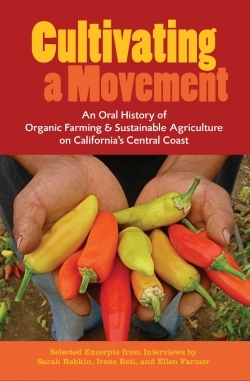Cultivating a Movement
An Oral History of Organic Farming and Sustainable Argiculture on California's Central Coast
With the growing shift toward eating organic, local food isn’t just a trend, but a fundamental change in the way we think about agriculture and our food, posit editors Irene Reti and Sarah Rabkin. For the roots of this movement, the pair believes that California’s Central Coast provided rich soil for food revolutionaries.
Along with interviewer Ellen Farmer, the editors were part of the Regional History Project at the University of California Santa Cruz (UCSC), taking on the task of tracking down and talking with farmers who started the organic movement in the United States. Although the work is a valuable addition to the history of California, it’s also a vital glimpse into the way that social, cultural, and environmental factors can be changed by passionate activists.
“Their challenge is far from over, and as a nation we still may be in the incipient stages of this transition in the way we grow our food,” writes UCSC history professor Linda Ivey in the foreword. “However, their voices recorded in this volume remind us how far our society has come since these first pioneers experimented in their ‘suspect’ practices of sustainable cultivation.”
The choice to feature the memories of farmers, educators, and activists in their own words makes for a spectacular, intimate volume that blends history and politics with personal strength, faith, and perseverance. Some of those interviewed, such as Dick Peixoto, grew up around “traditional” farms where pesticides were heavily used and experienced a wake-up call to organic growing. Peixoto recalls working in blackberry fields as a teenager and seeing dead rabbits and birds after each pesticide spraying. The image stuck with him, and he started his own organic farm in the mid-1990s.
Others in the interview lineup are activists intent on changing how organic food is delivered or viewed by consumers. For example, Tim Galarneau started a national campaign promoting sustainable food sourcing in college dining halls. In his section, he remembers growing up with fast food, and being excited about anything involving ketchup. But when he began to buy food for himself, he started reading about genetically modified food and water issues, and his views on food changed considerably.
In twenty-seven other profiles, the editors capture the thoughts of politicians, migrant workers, and pioneers in the community-supported agriculture movement. This work is oral history at its finest—bringing the voices of a movement together into a powerful,
cohesive whole.
Reviewed by
Elizabeth Millard
Disclosure: This article is not an endorsement, but a review. The publisher of this book provided free copies of the book to have their book reviewed by a professional reviewer. No fee was paid by the publisher for this review. Foreword Reviews only recommends books that we love. Foreword Magazine, Inc. is disclosing this in accordance with the Federal Trade Commission’s 16 CFR, Part 255.

